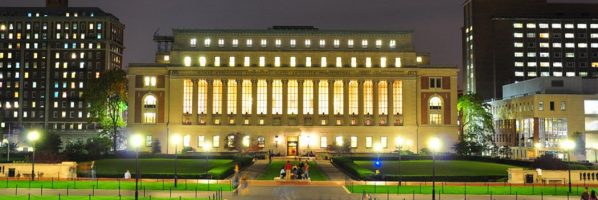The Reason Digital Ads Seem So Personal, According to Columbia Business School Research

Ad optimization, at its core, was always about effectively persuading human emotion. Those consumer habits, according to new research from the Columbia Business School, can be traced right down to individual digital footprint, helping “people overcome their human limitations.”
In new research entitled “Psychological Targeting as an Effective Approach to Digital Mass Persuasion” published in the Proceedings of the National Academy of Science, Assistant Professor of Business Management Sandra Matz’s team explores a new development in the idea of “personalized persuasion.” Thanks to the accessibility of our digital footprints, marketers can now tailor persuasive messages to a “person’s fundamental character traits and psychological needs.”
Professor Matz and her co-authors conducted three experiments in which they targeted over 3.5 million Facebook users based on “Likes,” then measured users’ reactions (i.e. “clicks” and “conversions”) to “persuasive appeals in the form of Facebook ads that either aligned with or ran counter to the users’ psychological profiles.”
In one experiment, the researchers customized online beauty retailer ads that targeted either introverts or extroverts, based on their unique Facebook Likes. The researchers found that “matching the content of persuasive messages to individuals’ psychological characteristics resulted in up to 40 percent more clicks and up to 50 percent more purchases than their mismatching or un-personalized messages.”
While psychological targeting certainly has many advantages when it comes to product positioning, it has the potential to be more insidious. On a more individual level, psychological targeting can easily be “used to exploit weaknesses in people’s character and persuade them to take action against their best interest,” such as Facebook users with psychological traits related to pathological or compulsive behaviors.
The authors actively embrace the numerous ethical questions that surround the application of psychological targeting:
“How do we as consumers and society at-large want to use this new technology? In what settings do we want to facilitate its application, and when do we want to restrict it? For which purposes should we use it, for which should we not? Under which agreements should we be allowed to implement it, and with which required degree of transparency?”
Columbia Business School Announces New M.S. in Business Analytics Degree

Columbia Business School (CBS), together with Columbia Engineering, yesterday announced a new full-time Master of Science in Business Analytics degree. Distinct from CBS’s MBA degree, the new program features a three-semester curriculum and is really geared toward students who want to learn the modeling techniques and data science tools that help businesses use data to influence decision making. A unique capstone project will serve as a key element of the new program, through which students will work with actual clients and relevant data sets to put the skills they’ve learned to work helping solve those companies’ real-world business problems. The capstone course will extend over the full three semesters of the program.
The program was developed jointly by faculty at both CBS and Columbia Engineering, and the resulting curriculum is designed to prepare graduates to excel in careers both as consulting analysts and associates and as business analysts and data scientists in fields including financial and professional services, technology, advertising and media, and other professions that require both a deep understanding and practical application of data analytics.
“By tapping into the vibrant and diverse business ecosystem that can only be found in New York, Columbia Business School and Columbia Engineering are uniquely situated to offer this new Master’s degree,” CBS Dean Glenn Hubbard said in a statement. “We see this as a must-do program for any future business person who wants to have a leg up in using data to make informed business decisions.”
CBS Enters an Already Crowded Field
Columbia is far from the first to announce a new data analytics master’s program—and it likely won’t be the last. It joins a long and growing list of other leading business schools that have sensed demand from both students and recruiters for programs that marry some of the skill sets of the MBA with the deeper study of data science and analytics that engineering faculty can provide.
MIT Sloan School of Management last year launched its own Master of Business Analytics (MBAn) degree, with leadership and support from the MIT Operations Research Center. In just one year, applications to the program have more than doubled—from 300 to 800—making the degree the most competitive at the school, with an admissions rate of less than 4 percent, the school reports. And just last month Sloan unveiled a new Business Analytics Certificate program that will be open to students in all MIT masters-level programs who want more rigorous academic content focused on data science.
Not to be left out, last month the University of Virginia’s Darden School of Business announced the launch of a new MBA+MSDS dual-degree program, which grants a Master of Data Science degree from UVA’s Data Science Institute and an MBA from Darden in 24 months (tuition for the MBA+MSDA program is the sum of each individual program’s standalone tuition). The program welcomed a pilot cohort this past summer, and Darden is currently accepting applications for the full program, which will launch in 2018.
NYU Stern, for its part, is now accepting applications for the inaugural class of a new specialized one-year Tech MBA, first announced last spring. And just yesterday Stern shared that an $8 million alumni gift will fund creation of a new center for technology, business, and innovation.
YOU MIGHT ALSO LIKE: More Business Schools Training MBA Students for Careers in Tech
Harvard Business School (HBS), too, sees where the action’s at and doesn’t intend to sit idly on the sidelines. In August 2017—together with the Harvard John A. Paulson School of Engineering and Applied Sciences and the Faculty of Arts and Sciences—HBS announced a partnership with 2U, Inc. to deliver a new online certificate program in business analytics. Expected to welcome its first cohort of students in March 2018, the Harvard Business Analytics Certificate Program is designed to help business leaders—including MBA grads—keep up with and leverage the explosion of data now available in every industry.
Some Schools Were Out in Front
Of course, amid this recent flurry of activity to enhance academic offerings at the intersection of technology and business, some schools can claim clear first-mover advantage. MBA students at CMU’s Tepper School of Business can opt to pursue a Technology Leadership MBA Track, a joint partnership between the Tepper School and Carnegie Mellon’s top-ranked School of Computer Science—indeed, it is one of the most popular offerings in the MBA program. Tepper also offers a three-year, dual-degree MBA/Master of Software Engineering program, also in partnership with the School of Computer Science.
And Stanford Graduate School of Business has for several years offered its students the opportunity to pursue a dual degree of significant relevance to students interested in careers in tech. Its joint MA in Computer Science/MBA degree links two of the university’s world-class programs and helps students develop a unique skill set ideal for becoming a manager and/or entrepreneur for new technology ventures. Stanford’s program includes a year of courses at each the GSB and in the Computer Science department followed by a third year of elective courses in both programs, enabling students to shave off one to two semesters it would take to complete both degrees separately.
RELATED: Best Business Schools to Jumpstart Your Career in Tech—Or Advance It
It Only Makes Sense
Whether beginning several years ago or just getting off the ground now, that business schools are recognizing and responding to market demand for business fundamentals married with data science know-how makes complete sense.
“The role of analytics has grown increasingly critical for most sectors of the economy,” Columbia Engineering Dean Mary C. Boyce said in a press release. “Our partnership with Columbia Business School combines our strength in data science, optimization, stochastic modeling, and analytics with their strength in data-driven decision-making for business and marketing to create a rigorous new master’s degree program.”
What Sets Columbia’s New Program Apart?
So what sets the newest program announced yesterday by Columbia apart from others in a crowded field? One distinguishing feature of the M.S. in Business Analytics is the capstone project that will put students to work on real-life consulting projects with companies using the companies’ own data, the school argues. “By working on real-world consulting projects, with real-world data, students will use the modeling techniques and data science tools to provide pragmatic solutions to the practical problems that businesses are facing today,” Costis Maglaras, professor and chair of CBS’s Decision, Risk & Operations Division, said in a press release.
Students in the new Columbia Business analytics degree program will also have valuable access to dedicated career placement services, the school notes, starting with completing a required Professional Development and Leadership course. “The M.S. in Business Analytics combines classroom instruction by distinguished Columbia professors with the experience of working on real-world problems via the capstone project course,” Columbia Engineering Professor Garud Iyengar said in the press release. “We expect this program to have 100 percent placement of its graduates as do our very successful M.S. in Management Science and Engineering and M.S. in Financial Engineering programs.”
Applications are currently being accepted for the first cohort of this new M.S. in Business Analytics. Students can choose to complete the program in one year by taking a summer semester or can take three non-contiguous semesters (fall, spring, fall), which would reserve the possibility of a summer internship.
For more information about the new Columbia M.S. in Business Analytics, click here.
This article has been edited and republished with permissions from our sister site, Clear Admit.
Supply Chain Management MBAs: The Best New York Programs

Product outsourcing is a hot topic today. Consequently, the supply chain management field is richer, more complex, and more necessary than ever. Optimizing the process of turning a concept into a product and getting that product to the shelf is integral to the success any retailer. No matter where a product is made, the progression from conception to end user is a collaborative effort. An MBA in supply chain management can help you learn who to contact and how to strategize in order to best serve both retailers and consumers.
New York City is among the retail capitals of the world. Schools in the New York metro have easy access to hundreds of CEO speakers, as well as a deluge of internship and job opportunities. Below, we’ve outlined some of our favorites.
The Best NYC Supply Chain Management MBA Programs
Columbia Business School
Though Columbia Business School does not offer concentrations, it would be remiss not to mention this academic powerhouse when considering programs with resources in supply chain management education. Columbia’s supply chain management courses are taught by extraordinarily well-regarded professors, who may serve as resources for students throughout their time at the school. Medini R. Singh, for example, is a sought-after professor. In addition to his 25+ years of teaching experience and numerous teaching awards, Singh serves on the advisory board for the W. Edwards Deming Center for Quality, Productivity, and Competitiveness. According to his bio, Singh’s research focuses on “service and supply chain design, at both the tactical and strategic level.” Singh has also consulted for multiple Fortune 500 companies. Columbia students MBAs will also have access to Awi Federgruen, the Charles E. Exley Professor of Management and Chair of the Decision, Risk and Operations Division of Columbia Business School. Federgruen has published over 120 pieces on the financial services industry, and often consults on supply chain management issues for large corporations.
Rutgers Business School, Newark and New Brunswick
Rutgers Business School offers a Supply Chain Management MBA, the mission of which, according to the website, is to “prepare students to meet and exceed the expectations of the employees experiencing a growing demand for supply chain management and logistics experts.” In fact, the school’s Supply Chain Management program was ranked eleventh on U.S. News & World Report’s 2016 list of best graduate schools for business. This ranking seems apt, considering a whopping 100 percent of the supply chain management MBA students from the class of 2016 were employed within 90 days of graduation. Students of this program have gone on to work various supply chain management jobs at companies like Este Lauder, Colgate, and Johnson & Johnson.
CHECK THIS OUT: Looking At New York City’s Best MBA Return on Investment (Pt. I)
Stern School of Business—New York University
The renowned New York University Stern School of Business provides students with the option of choosing a Supply Chain Management and Global Sourcing Concentration to equip MBAs to navigate supply chain issues in a global economy. Students who pursue this concentration can take classes like Global Sourcing and Open Innovation, Pricing Strategies, and Building and Managing Customer Relationships. Stern gears the specialization toward students aiming to pursue careers in management consulting, managing information systems, product management, and supply chain management. Students in this program can choose two of three core supply chain management courses, and then must take six of the 24 related elective courses.
Gabelli School of Business—Fordham University
The Gabelli School of Business at Fordham University offers many classes that specialize in supply chain management, including Operations Management. Under chair Sarah Jinhui Wu, the Gabelli Operations Management courses “equip students with a solid understanding of core operations concepts and decisions, rigorous analytical thinking and skills, and a creative mindset so they can deal with all of the complex issues of a supply chain.”
Many of the other concentrations offered in the Gabelli School of Business MBA program also offer courses revolving around supply chain management, including Global Sustainability.
Looking At New York City’s Best MBA Return on Investment (Pt. I)

As real estate in all five boroughs continues to rise, and/or get snapped up by oh-so-wonderful oligarchs, New York City’s pressure cooker reputation has taken a turn for the … banal.
Columbia Research Illuminates Unconscious Cause of Fake News

Fake news, the most oft-repeated phrase of 2017, doesn’t just rise out of some malevolent direction. According to Columbia Business School, there are many social factors hidden in the process.
Fake news has become an epidemic of sorts, as the recent investigation into how Russia used divisive Facebook posts to possibly influence the presidential election demonstrates, planted stories can have a “powerful and multiplying effect” due to their circulation on social media. Reportedly, fake news possibly impacted elections France and Kenya, as well.
Gita Johar, the Meyer Feldberg Professor of Business at Columbia Business School, along with doctoral students Youjung Jun and Rachel Meng, published research entitled Perceived Social Presence Reduces Fact-Checking in which they discovered that people are less likely to investigate the veracity of ambiguous claims when they are “consumed in a group setting” and when that information “aligns with their own party affiliation.”
According to the article, Johar, Jun, and Meng “conducted eight experiments to evaluate how the presence of others affects the way that people evaluate information and the extent to which people verify ambiguous claims.” The study found that “perceiving the company of others seemed to influence people’s willingness to verify information, not how much they believed it.” Their research posited three potential reasons why “collective settings may suppress fact checking.”
- Individuals may exert less effort (and hence be less likely to fact-check claims) because they expect to ‘free ride’ on others.
- People may abide by social norms that lead them to take the words of others at face value.
- Crowds may inherently cause people to feel ‘safety in numbers,’ which decreases vigilance in general.
Johar concludes, “Animals in the wild hide out and feel safer in herds and, similarly, we feel safer in a crowd. When applied to information consumed on social media, this same instinct results in lower fact-checking.”
You can read more about the trio’s research on fake news stories on the official Columbia Business School website.
Columbia Study Finds Link Between Language and Loan Default

For financial experts, there’s a thin line between word choice and loan default. Columbia Business School recently explored the seemingly innocuous connection.
